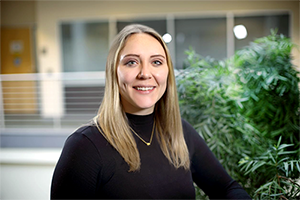
Making Change Possible: A Health Coach’s Story
Making Change Possible: A Health Coach's Story
Motivational interviewing and supports nudge Baltimore residents to reduce their risk of type 2 diabetes
Published July 18, 2024
Most of Alex do Couto’s clients already know they should be exercising and eating healthy, but like many people, they need a little help to get there.

Do Couto is a Lifestyle Interventionist for the Diabetes Prevention Program at the Johns Hopkins Brancati Center, a participating organization in the CMS Innovation Center’s Medicare Diabetes Prevention Program (MDPP). She uses a counseling style called “motivational interviewing” to help her clients reduce their risk of type 2 diabetes.
Instead of dictating advice, she said, “We rely on the expertise of the client. We just nudge them.”
A little bit of nudging goes a long way. Since 2016, 60% of the older adults participating in the Brancati Center program have met one or more of the goals set by the Center for Disease Control and Prevention’s National Diabetes Prevention Program: 5% reduction in bodyweight, a 4% reduction in bodyweight with 150 minutes of physical activity per week, or a 0.2% reduction in A1C, a test that measures blood sugar levels.
Nearly 1 in 3 adults aged 65 and older have diabetes, and medical care for diabetes for people over 65 cost the nation about $205 billion in 2022, most of which was paid by Medicare. Fortunately, type 2 diabetes can often be delayed or prevented with health behavior changes.
Title here
“It has been incredibly rewarding, more than I ever imagined. I never saw myself in the role of Lifestyle Interventionist, seeing people glow and be so proud of themselves, finding small changes they’re actually excited about. I helped a little bit, but it was really them at the end of the day. They made the change possible.”
The MDPP supports participating health care providers, called MDPP suppliers, to implement the National Diabetes Prevention Program to prevent the onset of type 2 diabetes for people with prediabetes. MDPP became an expanded model in 2018 after an earlier model test demonstrated significant weight loss for people with Medicare and cost savings for Medicare. The program is a structured lifestyle intervention which includes group support, classes, and guidance from coaches like do Couto.
Do Couto first learned about motivational interviewing while studying sports psychology in graduate school. The technique, which has roots in substance abuse counseling, encourages behavior change by meeting people where they are regarding their readiness to make changes. For example, do Couto said she might have a client who is aware of their indication of pre-diabetes and family history of diabetes, but still tells her they don’t want to stop eating their favorite fast-food breakfast sandwich.
“What I would say is, even with the fast food, part of you does want to be healthier,” explained do Couto, who then asks, “What is one small change you could make? Then we might discuss the pros and cons of that change.”

This approach bears results. Do Couto recalled one of her eldest clients, a woman with multiple chronic conditions, including arthritis. She started out hesitantly but lost 20% of her weight over the course of the program. The best part was that her lifestyle changes improved several other health issues. She now slept seven to eight hours a night as opposed to three, reduced her medications, and took much longer walks. Even through a Zoom screen, do Couto could see how much spryer her client looked, but more importantly, “She felt so much better.”
Brancati Center Director, Dr. Nisa Maruthur, said that by supporting weight loss and moderate-intensity activity, the program has many spillover effects.
“If you increase physical activity, that will help your hypertension. If you are changing your diet, that will help your cholesterol. It can also give you more energy and improve your mood.”
The lightbulb went off for Dr. Maruthur when she was in medical school.
“I was a third-year medical student working in the endocrinology clinic when I remember reading about a diabetes clinical trial that was stopped early because the preventative benefit was so strong. I was blown away that the lifestyle intervention seemed more protective against risk than [the drug] metformin.”
Maruthur would go on to do her residency at Johns Hopkins in primary care, instead of endocrinology, where she could focus on diabetes prevention.
She noted that the Brancati Center’s clients in Baltimore face many obstacles which impact their health, such as lack of access to grocery stores, housing, finances, and technology devices or internet service. As part of the intake process, program staff assess clients’ specific needs and provide wraparound services, facilitated by two full-time community health workers.
Often, community health workers will go to clients’ houses to set up Zoom accounts and walk them through the software. MDPP sessions can be offered both in-person and virtually, which helps to reduce barriers to participation like transportation and childcare. Community health workers also connect clients with resources like food pantries and housing assistance programs. They even facilitated a pet adoption for a client who wanted a dog as encouragement to take more walks.
At the end of the day, though, do Couto gives most of the credit to her clients.
“It has been incredibly rewarding, more than I ever imagined. I never saw myself in the role of Lifestyle Interventionist, seeing people glow and be so proud of themselves, finding small changes they’re actually excited about. I helped a little bit, but it was really them at the end of the day. They made the change possible.”